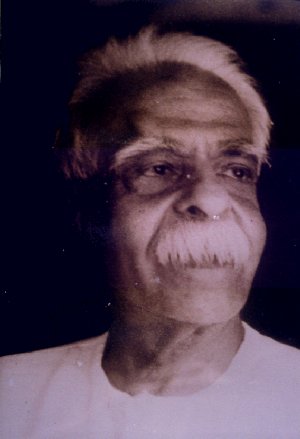Rashtrakavi M. Govind Pai
Dr. Jyotsna Kamat
First Online: June 01, 2004
Page Last Updated: December 07, 2024
Mangalore Govind Pai was a rare genius Karnataka had ever seen. A frontline poet in Kannada, thinker, historian, researcher and a polyglot, all put together. He could not complete his Bachelor's degree exam due to his father's sudden death but won a gold medal in English, for the paper he was able to write in that exam of Madras University. Nearly sixty years of his life he spent in a small village of Manjeshwar, now in Kasargod Taluk of Kerala State, and taught himself several subjects and languages.
© K. L. Kamat

M. Govind Pai (1883-1963)
Born in a well-to-do Goud Saraswat family of Mangalore, Pai was brilliant student at school and had Panje Mangesh Rao as his guru at school, who was a great writer and teacher of Kannada. Pai came to own property from his mother's side in Manjeshwar and was compelled to stay there. He built an excellent home-library for self-study which contained more than five thousand volumes in thirty-six languages at the time of his death. He was conversant in many Indian languages like Bengali, Gujarathi, Marathi, Tamil, Telugu, Malayalam, Urdu, Pali, Sanskrit, Kannada, and Tulu. Konkani was his mother tongue. He taught himself Latin, Greek, French, Spanish and German and utilized the original sources in historical research. His meticulously maintained study-books, notes and diaries speak volumes of the painstaking hours, days, moths and years in studying various languages and cultures.
For most of us, dictionary is an occasional reference book. But for Pai, it was a study book! Kittel's Kannada-English dictionary has 1752 pages. Pai studied every page, and as was his habit had noted points, question mark, etc in the margin of every page.
Govind Pai was married at a very young age to Krishnabai, a chronic asthma patient. She died early without leaving any issue. Pai was very much attached to her and did not marry again. Everyday he used to offer flowers at her portrait and wrote 'Nandadeepa' - a collection of poems in her memory. He was very fond of children and spent one or two hours every day with children after twelve to fourteen hours in his study. He brought up his nephews as his own. He led an ascetics' life.
His Manjeshwar home was open to all types of people, scholars, writers, youngsters and casual visitors. Everybody was touched by the poet's hospitality, concern and affection. He was called belli miseh magu (silver mush babe) for his innocent and cheerful nature, by Bannanje, a noted poet and scholar.
He remained away form public glare or publicity, reading and writing all the time. But scholars and academicians did not forget him. He was made President of Kannada Sahitya Sammelan (Literary Meet) at Mumbai in 1950. The government of Madras Presidency bestowed the title of 'Rashtrakavi'. Both were rare honors.
Pai wrote more than two hundred poems, three plays and more than two hundred essays. He shone as historical researcher fixing dates and places of Kannada rulers and kingdoms. He identified Kannada names from ancient Greek classics including Ptolemy.
He wrote an authentic essay regarding migration of Saraswats from Punjab to Goa and origin of Konkani language which remains unchallenged till date.
M.G.M. college of Udupi (see: Town of Udupi) which acquired his huge library, has turned the building into a museum dedicated to his memory. Now a well known research center, it has brought out a 1400 paged volume of M. Govind Pai's complete works.
Pai's written contributions are less compared to his vast scholarship. But the legacy he has left is a great one.
His ancestral house at Manjeshwar is a Memorial with a Arts college in the premises.
![]()

